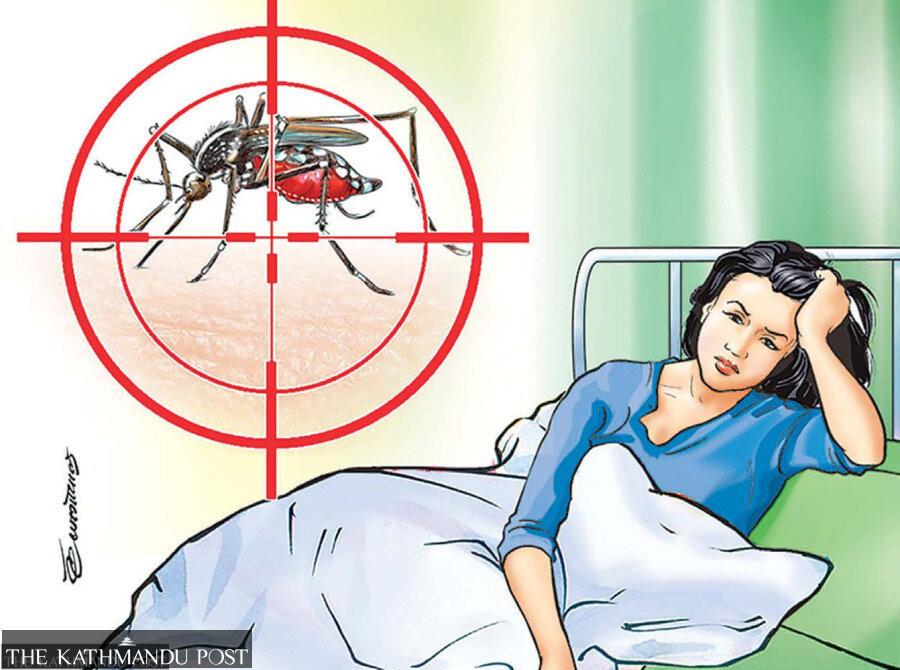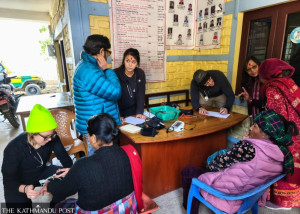Health
Winter offers no relief from dengue
Experts urge continued vigilance as dengue remains a year-round threat in Nepal.
Post Report
Though winter has already set in and the minimum temperature has dropped to seven degrees Celsius, the scourge of dengue-spreading mosquitoes continues unabated. Officials at the Ministry of Health and Population said that even though the number of infections from the deadly virus has declined, people are still contracting the disease.
“Like in the previous year, we have not expected zero dengue cases in any particular month,” said Dr Gokarna Dahal, chief of the Vector Control Section at the Epidemiology and Disease Control Division. “New cases of dengue infection are still being reported from various districts.”
Dengue is a mosquito-borne disease transmitted by female Aedes aegypti and Aedes albopictus mosquitoes. The same vector also transmits chikungunya, yellow fever, and Zika, according to the World Health Organisation.
Post-monsoon is considered a high transmission season for dengue, but Nepal has witnessed outbreaks of the deadly disease since the start of the year and in the pre-monsoon and monsoon seasons as well.
Entomologists say that even if dengue spread slows naturally in the winter, the risk of infection with the deadly virus has not lessened, as the daytime maximum temperature suits virus-spreading vectors to get active.
“In summer, Aedes mosquitoes bite people in the morning and evening, but in winter, they become active during the daytime when temperatures rise,” said Sishir Panta, an entomologist. “And we should not forget that even though the growth of the virus-spreading vectors slows down in winter due to cold, it does not stop.”
Thirteen people have died, and over 34,000 have been infected since January 2024, according to government data. The virus has spread in all 77 districts across the country. Experts say reported dengue cases may only represent a small fraction of the true scale of the outbreak, as around 90 percent of the infected people do not show any symptoms and health authorities often underreport deaths and infections.
Many people infected with dengue show mild symptoms, which do not need any treatment or can be managed with paracetamol at home.
As there is no specific treatment for dengue, health workers provide symptomatic care and diagnose patients based on symptoms, including platelet-rich plasma transfusion.
According to experts, dengue became endemic in Nepal years ago, meaning that people get infected throughout the year.
“New cases could surge once temperatures rise,” said Panta. “Also, the general public should not be complacent, as the risk has not been over. Prevention measures are essential to preventing the spread.”
Experts say the disease will not stop spreading unless the lessons and experiences gained in previous outbreaks are implemented.
Dengue-transmitting mosquitoes breed in clean water and bite people in daylight. Uncovered water tanks and discarded objects such as plastic cups and bottles could be breeding grounds for dengue-carrying mosquitoes.
According to doctors, mild to high fever, severe muscle pain, rashes, severe headache and pain in the eyes are some symptoms of dengue. Doctors advise that those with these symptoms should seek immediate treatment. While there is no specific cure for the disease, early detection and access to proper medical care can lower fatalities.
Nepal reported its first dengue case in a foreigner in 2004 in the Chitwan district. Since then, an increasing number of dengue infections, including major outbreaks, have been reported from many districts.
The World Health Organisation (WHO) says there is no specific treatment for severe dengue, but early detection and access to proper medical care can save lives.




 10.12°C Kathmandu
10.12°C Kathmandu













